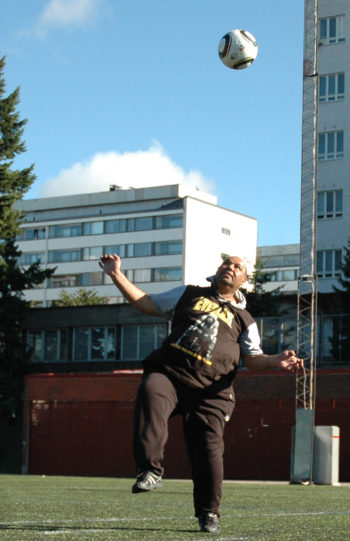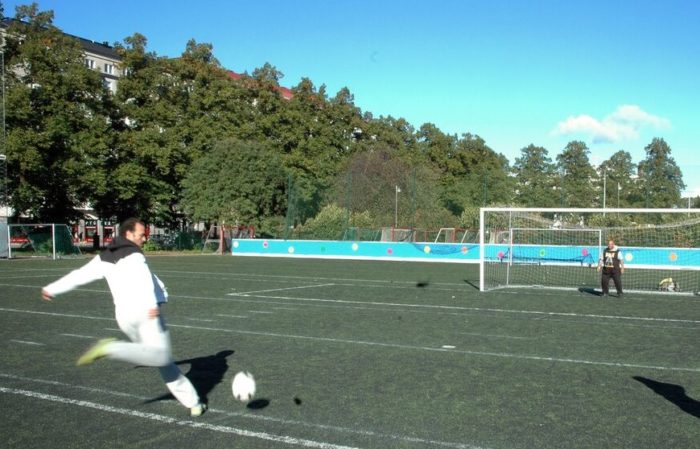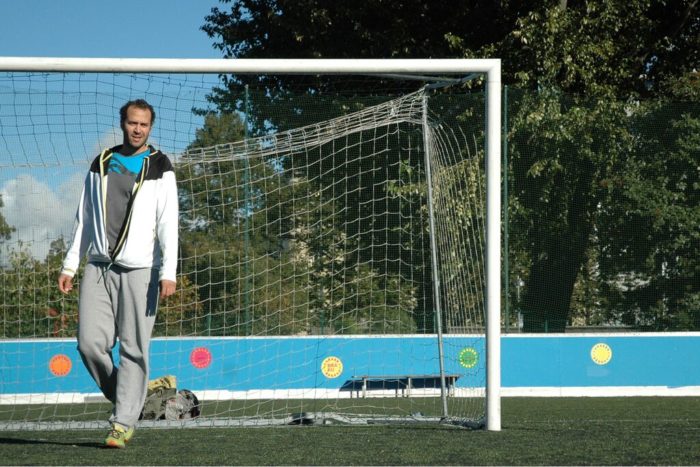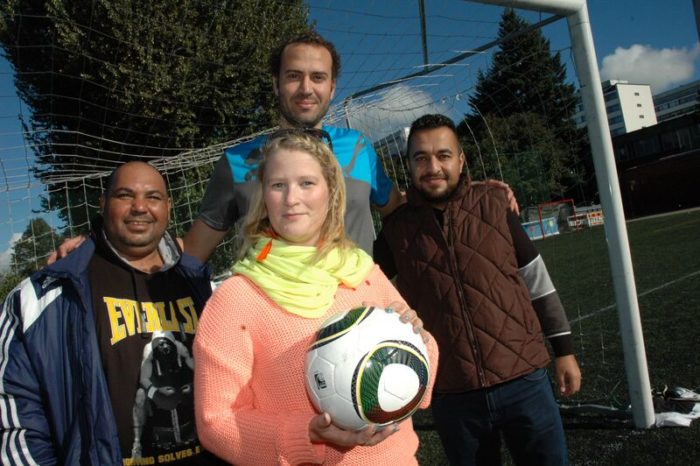By arranging free football games, a group organised through Facebook is helping Kallio, Helsinki’s residents and reception centre inhabitants to meet.
The Haapaniemi sports field located in Helsinki is often empty in the afternoons. However, the building only a few hundred meters away at Kaarlenkatu is bustling: asylum seekers from crisis areas live there, and they are arriving in Finland at a higher rate than ever before. In a strange country surrounded by strange culture, the days drag on for the newcomers. They are bored, even anxious.
In the early autumn, an idea was formed on the internet: what if the locals played football with the asylum seekers during the afternoons?
“We want to offer the newly arrived a first impression that Finns are nice people,” reports Tiia Nohynek, dance teacher and active member of Meet the Neighbours Football Club.
First matter in hand was to make sure that it was all right to use the football field for free, since the group of volunteers had no official organisation or assets for the aid work. They were only driven by their passion to help asylum seekers integrate. The company running the football field Haapaniemen kenttä decided to support the club’s idea by letting them use the field for playing when there were no reservations. Football shoes, shirts and shorts were gathered for players through donations.
“The residents in the area wanted to do something with the asylum seekers that unites everyone. After all, football is a universal language,” says Nohynek.
‘Disco disco’

Mustafa Abdelwahab is glad for the opportunity to play football, since it helps him put his life as an asylum seeker out of his mind for a moment. Photo: Antti Kivimäki
Although Tiia Nohynek is the daughter of a football player, she does not play at the Club. Instead, she is in charge of the operations: getting asylum seekers from the centre to the field. She also washes and dries the players’ shirts so eagerly that sometimes her own laundry is neglected.
And her will to help doesn’t end at football. A few weeks ago, Nohynek promised to take a couple of asylum seekers to a free reggae party at The International Culture Centre Caisa.
“When I went to pick them up from the reception centre, there were 40 guys waiting, saying ’Let’s go to the disco!’ After that, they have started to call out ‘disco disco’ or ‘football’ every time they see me”, Nohynek laughs.
This becomes abundantly clear, as Nohynek and another active member of Meet the Neighbours, Mohamed Abdelgayed , are picking up a couple of Iraqi asylum seekers to play football.
“Disco, disco”, repeats Mustafa Abdelwahab, a lively chauffeur from Baghdad, while smiling widely at Nohynek.
“It has been very important to get to play football in Helsinki. Everyone can forget their situation as asylum seekers and feel like they are starting something new,” says Abdelwahab gratefully.
“In Iraq, people didn’t play much football due to violence, but here I have already played three times.”
Abdelwahab worked for a long time as a chauffeur in Baghdad for the Ministry of Agriculture. Difficulties started for him when the ministry transferred from being under the Sunni authority to the Shia, since Abdelwahab himself is a Sunni Muslim.
“I was no longer given assignments as a chauffeur; they told me to clean the toilets.”
Soon, Abdelwahab started to receive intimidating telephone calls threatening that he would be kidnapped – meaning assassinated – if he would not give up his job. Pressure kept building, and Mustafa Abdelwahab decided to flee from Iraq.
The other man joining them to play football is Ali Gazi, a restauranteur from Mosul. He is quieter than Abdelwahab, and clearly nervous. He is concerned for the health of his three-month-pregnant wife and their eight-month-old child, and whether they will receive the treatment they might need in Finland.
Mohamed Abdelgayed, who is originally from Egypt, reassures Gazi in Arabic that the Finnish health care system takes good care of both children and mothers.
Interested in working

Mohamed Abdelgayed (left) and Tiia Nohynek arrange free football games for asylum seekers and Finns. At the goal is Iraqi asylum seeker Mustafa Abdelwahab.Photo: Antti Kivimäki
Both Iraqi men would like to get work soon in their own fields: Ali Gazi in the kitchen and Mustafa Abdelwahab at the wheel.
Firstly, they need a permit to work in Finland, and this will take months. An asylum seeker may work in Finland even before receiving a residence permit, but only after residing in Finland for at least three months.
Mohamed Abdelgayed tries to calm the men’s eagerness to work and reminds them that it might be useful to learn the Finnish language and culture before starting work.
Ali Gazi ran a restaurant in Mosul in northern Iraq, but after the area was taken over by Isis life there became unbearable. Gazi is a Sunni Muslim, but his wife is Shia, and this did not sit well with Isis. Isis activists attacked Gazi’s restaurant, breaking and stealing everything, so Gazi thought it would be wisest to flee the country with his family.
Gazi himself does not play football, but he likes to sit by the field to rest his nerves.
“As a child, there was no time for recreation; we needed to work. I like to watch people playing football,” he says.
Finland’s organised football culture

Last year, the referee club Helsingin Erotuomarikerho titled Egyptian Mohamed Abdelgayed the “King of Gravel Pitches”.Photo: Antti Kivimäki
Mohamed Abdelgayed, active member of Meet the Neighbours, moved to Finland with his wife in search of work six years ago – before the Arab Spring and Egypt sliding into a cycle of violence – and he is now working as a sous chef at one of the top restaurants in Helsinki.
In Egypt, he used to play football in junior division One, and after arriving in Helsinki, he eagerly joined the adults’ divisions Three and Four.
“It helped me to integrate into the society. I met Finnish people and got to talk to them.”
A muscle injury ended Abdelgayed’s serious football playing a few years ago. To stay connected to the sport, he took a course in football refereeing, and now he referees local games of lower leagues in Helsinki. Last year, the referee club Helsingin Erotuomarikerho titled him the “King of Gravel Pitches”.
Abdelgayed appreciates the fact that Finland’s football culture is very organised. Games and practices are held on time, and the field is punctually cleared for the next team. Finns also respect referees, so Abdelgayed has been able to referee in peace here.
“In some countries, referees get threatened.”
Help for symptoms of trauma

Mustafa Abdelwahab (left), Tiia Nohynek, Mohamed Abdelgayed and Ali Gazi gather regularly to the football field. Mustafa and Mohamed are usually playing, Tiia is organising and Ali is watching others play. Photo: Antti Kivimäki
The significance of football in creating solidarity between asylum seekers and Finns has been noticed in other places as well. In the Ruukki reception centre in Northern Ostrobothnia football is very popular, and asylum seekers play among themselves and with local residents.
“Right now, there are so many people coming in that our efforts are focused on basic things such as arranging accommodation. But as things calm down, we’ll have more time to spare for leisure time activities,” tells Director of the Centre Sirpa Kallio.
Kallio, who has also worked as a psychotherapist, emphasises that activities are important in reception centres. Most asylum seekers are willing to work, but the remote Ruukki does not offer many opportunities.
“Most of the people arriving have worked or studied in their homeland – and suddenly everything stops. If a person is without work or something else to do, it leaves an impact.”
“For sporty people, sports is a good way to help symptoms of trauma. Even if people are depressed and anxious, they should not exclude the thing that brings them joy.”
By: Antti Kivimäki, September 2015
Finland and the Asylum SeekersThe flow of asylum seekers from the Mediterranean all the way to Finland has surprised everyone. Since it started, demonstrations have been organised both for and against, and the Finnish Prime Minister has promised to put up asylum seekers in his home. The number of asylum seekers coming to Finland has increasedDuring the last ten years Finland has received approximately 3,500 asylum seekers per year. The annual amount of those seeking asylum has varied between 1,505–5,988. This year, and specifically this autumn, the amount of people seeking asylum has increased enormously. Between January and August 2015 there were 7,015 asylum seekers, and in September alone there were 10,000 more. According to the Ministry of the Interior’s Forecast (14.10.2015) Finland will have a total of 35,000 asylum seekers this year. Demonstrations against and forThere have been demonstrations around Finland both for and against taking asylum seekers. Demonstrations against taking asylum seekers have, on average, attracted a few dozen participants in each city where they have been held. Mainly they have been located where new reception centres have been founded or on the border between Finland and Sweden in Tornio. As a counter reaction there have been several demonstrations in support of taking refugees. In the largest demonstration, in Helsinki at the end of July, more than 10,000 people demonstrated for a multicultural Finland. One group, Finland says Welcome, organised a welcome picnic where 1,500 people took part. The biggest sensation was caused by a case in Lahti during September where a bus carrying asylum seekers was shot at with fireworks by around 30 demonstrators, one of whom was a 19-year-old man wearing a Ku Klux Klan outfit. After the attack the Finnish Government strongly condemned all racist protesting. Read the statement here. The city of Lahti decided to strongly reject racism. Local businesses want to welcome the asylum seekers in Hennala to the sports city by organising a football event on 30 September 2015. The theme for the match, which will take place on the football ground close to the emergency shelter, is ‘Let’s play bAll together’. Also, there will be a demonstration by local residents against racism and violence in Lahti Market Square next Saturday, entitled ‘Open Lahti’. A large number of active residents help at the emergency shelter as Red Cross volunteers. There are a total of 150 volunteers working at the Hennala unit, which houses some 500 refugees. The asylum applying process gets jammedApplying for asylum in Finland is a long process. You may seek asylum if you have a well-founded fear of being persecuted in your home country. The Finnish asylum application procedure is explained here. Normally the decision of the asylum application has been made in six months. Now there’s a fear that the process will take over a year due to the unexpected amount of asylum seekers arriving in Finland. The Ministry of the Interior is trying to solve the situation by giving more resources to the Police and The Finnish Immigration Service. There is a huge need for housing for asylum seekers across Finland. The Finnish Red Cross has 48 reception centers around Finland and due to the current flow of asylum seekers the country needs more than 500 housing places per day. People are willing to help asylum seekersThe Finnish prime minister Juha Sipilä led by example for the Finnish people on accepting asylum seekers. Sipilä offered his second home for asylum seekers to use coming at the end of the year. The house is located in his home town of Kempele in Northern Finland. Finns have been very active volunteers. The Finnish Red Cross alone has had over 4,500 sign-ups for volunteer work on their website. Many people have just walked into Red Cross premises and signed up for volunteer work. Tens of thousands of people have donated winter clothes, sports gear and household items for asylum seekers. The amounts given have been so enormous that the Finnish Red Cross has had to pause collections to allow donations to be sorted. The traditional Hunger Day fund-raising event organised by the Finnish Red Cross will most likely reach three million euros this autumn – which would make the result the third best in the history of Hunger Day. (Donations can be sent until the end of October.) Some of the volunteers are helping using their special skills. One example is a group of hair dressers who offer haircuts for the inhabitants of reception centers. |



